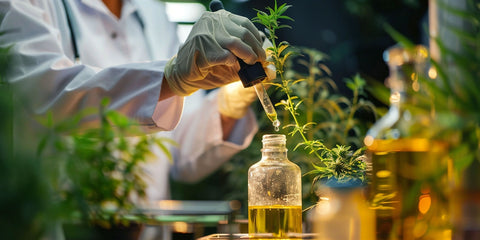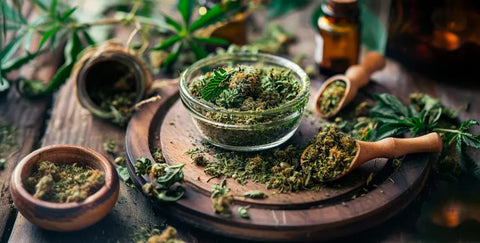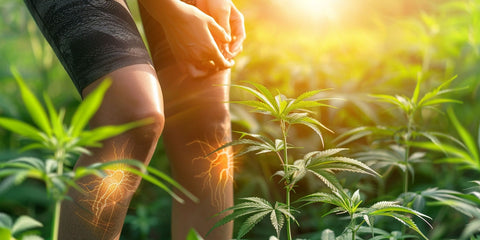In today's ever-growing CBD market, it can be challenging to determine whether the product you are purchasing is of good quality. With countless options available, it's essential to know what characteristics set apart high-quality CBD from its lower-quality counterparts.
The Basics of Good CBD
To effectively recognize high-quality CBD, it's necessary to understand and examine essential factors such as the source of hemp, extraction method, third-party lab testing, and other crucial indicators of purity and potency.
Source of Hemp
Hemp-derived CBD products should always come from a reputable source. High-quality CBD suppliers should provide information on where they get their hemp to ensure that it comes from safe and clean growing environments (most commonly Europe and the US). Additionally, organic hemp is preferred because it guarantees the absence of harmful pesticides and other potentially toxic substances during cultivation.
Extraction Method
The method by which CBD is extracted from hemp is vital to determining its overall quality. Generally, there are two primary methods for CBD extraction:
- CO2 extraction: This method involves the use of CO2 under high pressure and low temperature to preserve CBD and other beneficial compounds, producing a pure and potent extract.
- Ethanol (alcohol) extraction: While this method may also produce high-quality CBD, it can sometimes lead to the destruction of useful plant components in the process, resulting in less impressive final products.
Ultimately, CO2 extraction is considered the gold standard in CBD extraction, and top-tier CBD companies often employ this technique.
Third-Party Lab Testing
No matter where your CBD comes from or how it's extracted, third-party lab testing is a crucial aspect to consider. The best way to ensure you're getting what you pay for (and nothing more) is by selecting products that have been independently tested for potency and purity. Make sure the company you buy from provides transparent lab results from an accredited laboratory on their website.
THC Levels
An essential aspect of third-party lab testing is measuring THC levels in the product. Legally, hemp-derived CBD products must contain less than 0.2% (Europe) or 0.3% (US) THC, ensuring non-psychoactivity and legal compliance. High-quality CBD providers should always guarantee that their products stay within these limits.
Cannabinoid Profile
A comprehensive lab test will also analyze and confirm the concentration of each cannabinoid found in the product, including CBD as well as minor cannabinoids like CBG, CBN, or CBC. This information allows consumers to see exactly what they are purchasing and compare products based on their specific cannabinoid content.
The Appearance and Consistency of CBD Oils and Extracts
Once you've understood the underlying factors that contribute to good CBD quality, there are other ways to visually inspect your product before consuming it.
Color and Clarity
The color of the oil can provide insight into its quality. Typically, high-quality CBD oils range from golden yellow to dark green, with brighter colors indicating higher purity. Furthermore, a clear and transparent oil typically indicates a clean extraction process, while murkiness may suggest impurities or contaminants mixed into the product.
Consistency
The consistency of a CBD oil should be smooth and uniform, without any indication of separation between the oil and other components. High-quality CBD oils might exhibit some natural variations in color or cloudiness, but it should never appear as if different layers are present in the bottle.
Evaluating CBD Oils Using Your Senses
A well-trained nose and palate can also help you determine what to look for when choosing a good CBD oil. Look out for these characteristics in regard to smell and taste:
- Odeur: Top-shelf CBD oils typically exude a pleasant, earthy aroma – sometimes alongside a hint of nutty or fruity fragrance from the carrier oil.
- Taste: A quality CBD oil will often have a rich, grassy flavor that is reflective of the hemp plant's natural essence. Some tinctures may contain added flavors, such as mint or chocolate, to mask this taste, but don't let that discourage you from assessing the overall sensation on your palate.
- Fleeting Taste Test: To further decrypt the quality of your CBD, place a drop of oil on your tongue and focus on how quickly the taste dissipates. Ideally, the flavor should linger briefly before fading away smoothly, signifying high-grade and pure oil.
Premium Quality: Full-Spectrum vs Broad-Spectrum vs CBD Isolate
Last but not least, it's essential to understand your options regarding different types of CBD oils available in the market. The three primary categories include:
- Full-spectrum CBD: Contains all cannabinoids, terpenes, and flavonoids present in the hemp plant, including trace amounts of THC. This form is considered the most beneficial and effective due to the 'entourage effect,' where all compounds work synergistically.
- Broad-spectrum CBD: Similar to full-spectrum but without any THC, broad-spectrum products offer nearly all of the entourage effect benefits while ensuring total compliance with legal regulations on THC levels.
- CBD isolate: Consists of pure CBD (upwards of 99% purity) with no other cannabinoids or compounds involved. While it may be less effective than full-spectrum or broad-spectrum options, it's preferred for users seeking an entirely THC-free experience or requiring higher doses of CBD.
In conclusion, recognizing high-quality CBD involves keeping an eye out for various factors like source of hemp, extraction methods, lab testing results, appearance, consistency, and even using your senses. By staying informed about these attributes, you can ultimately make better choices when purchasing CBD products and reaping their therapeutic potential.



